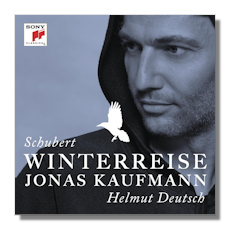
The Internet's Premier Classical Music Source
Related Links
- Schubert Reviews
- Latest Reviews
- More Reviews
-
By Composer
-
Collections
DVD & Blu-ray
Books
Concert Reviews
Articles/Interviews
Software
Audio
Search Amazon
Recommended Links
Site News
 CD Review
CD Review
Franz Schubert

Die Winterreise, D 911/Op. 89
- Gute Nacht (Good Night)
- Die Wetterfahne (The Weather Vane)
- Gefrorne Tränen (Frozen Tears)
- Erstarrung (Numbness)
- Der Lindenbaum (The Lime Tree)
- Wasserflut (Flood)
- Auf dem Flusse (On the River)
- Rückblick (Looking Back)
- Irrlicht (Will o' the wisp)
- Rast (Rest)
- Frühlingstraum (Dream of Springtime)
- Einsamkeit (Loneliness/Solitude)
- Die Post (The Post)
- Der greise Kopf (The Grey Head)
- Die Krähe (The Crow)
- Letzte Hoffnung (Last Hope)
- Im Dorfe (In the Village)
- Der stürmische Morgen (The Stormy Morning)
- Täuschung (Illusion)
- Der Wegweiser (The Signpost)
- Das Wirtshaus (The Inn)
- Mut (Courage)
- Die Nebensonnen (The Mock Suns)
- Der Leiermann (The Hurdy-Gurdy Man)
Jonas Kaufmann, tenor
Helmut Deutsch, piano
Sony Classical 88883-79565-2 70m
I suppose almost everyone hearing this new Die Winterreise, from experienced concertgoers and critics to amateur singers and casual listeners, will express great admiration for Kaufmann's resplendent and flexible tenor voice and his considerable interpretive abilities. Some may carp about certain aspects of his approach to this warhorse collection of songs, while citing their favorite version by Dietrich Fischer-Dieskau, Hermann Prey, Gerald Finley, Matthias Goerne or a host of others. But make no mistake about it, Kaufmann is the real thing, a tremendously compelling singer with talent to burn. He sings Schubert with passion and total commitment from first song to last. In the end, you can reach no other verdict than that this is one more major achievement in his growing and impressive discography.
Kaufmann certainly captures the essence of the mostly dark moods in Schubert's music (and Wilhelm Müller's poetry): in Gute Nacht (#1) he imparts an anxious sense of departure with an almost operatic intensity. There's much intensity in the ensuing Die Wetterfahne as well, but also a nervous feeling of exhilaration as Kaufmann's voice resounds with majestic power. Listen to his sensitivity and range in Irrlicht (#9): notice the subtle sense of intimacy and the many gradations in dynamics, and take note in particular of those arresting high closing notes. He catches the seeming simplicity and playfulness of Frülingstraum (#11), and he fully captures the dreamy but quirky quality of Tauschung (#19). I could go on citing further examples of his exceptional artistry in this collection, but suffice it to say that Kaufmann is utterly compelling in every song, consistently capturing its essence and drama.
Speaking of drama, there may be some listeners seeing a downside here, asserting that Kaufmann is too operatic in his treatment of Schubert, that he takes every opportunity to wring angst and drama from each moment in each song. But is that necessarily a weakness in a song cycle so full of drama and angst? I don't think so – in fact, it's a great strength. Moreover, Kaufmann's heldentenor voice seems perfect for this cycle, despite a common view that the greatest versions have been by baritones, like the aforementioned Fischer-Dieskau and Prey.
I would be remiss if I didn't commend Helmut Deutsch for his sensitive accompaniments throughout the cycle. He is a great artist in his own right. The sound reproduction by Sony is vivid and perfectly balanced. Highest recommendations!
Copyright © 2014, Robert Cummings





















